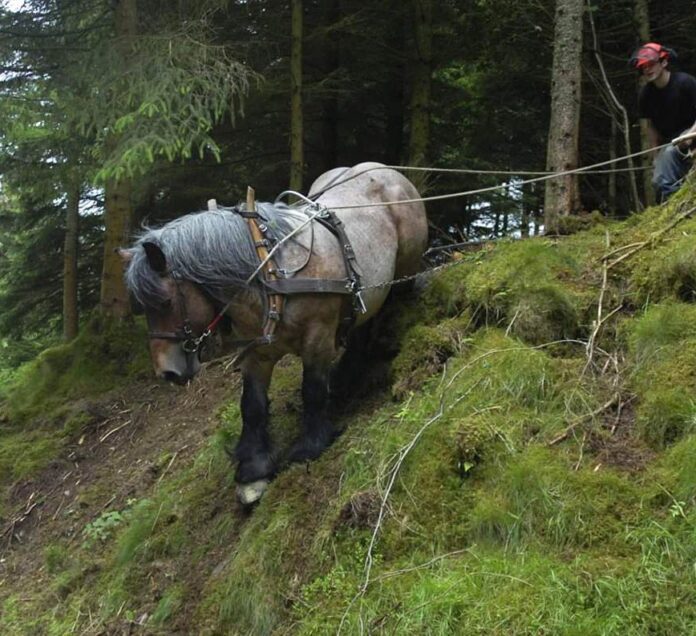
A COUNTY Limerick man is rubbing shoulders with royalty as he makes an environmental impact that will be appreciated for generations.
In 2001, Simon Lenihan moved his family and business from Mountcollins in County Limerick to Cumbria’s Lake District where he has worked for Prince Charles and chatted about horses Queen Elizabeth.
His business, ‘Celtic Horse Logging’ demonstrates how using horses instead of machines can save the forest environment and improve returns in the timber business.
“It’s the environmental side of timber harvesting where we use horses to do all the extraction,” said Simon. “The norm is mechanisation. However, we take a more sensitive approach.”
It’s a family concern for the Lenihans, with Simon, six sons and now a grandson working with horses and forestry.
Using horses to take out individual trees increases the commercial value of the timber that’s left because the horses can work around healthy established trees where machines would have to knock them to deal with a diseased or dangerous specimen at the heart of a forest.
As well as saving healthy trees, the horses’ hooves don’t compact the ground they work on.
Land worked by heavy logging machinery, in contrast, compacts the soil and it can take up to five years for water to again penetrate the ground.
The mechanical process has been blamed for serious flooding problems, with villages having to be evacuated and schools and businesses closed in Scotland.
The family and the specially bred Swedish horses work at sites of special scientific interest, those with access problems or places where previous mechanised harvesting has caused flooding.
“Forestry is a long-term business and a lot of people are starting to look at the environmental impact. The forest is not just about growing trees but looking at the complete ecosystem,” said Simon.
“It remains the most environmentally friendly, low-carbon form of timber harvesting. Horse loggers are often asked to work in difficult areas: big machines have their place, but, usually, other big machines then have to come in and repair the damage.
“When you are finished working with the horse, it has actually increased the value because you have taken out all the poor quality stems and left a healthy crop. With machinery, you are taking out a lot of what would be final crop trees.”
In Simon’s childhood days in Limerick, his father and grandfather both used horses to work the farm and he grew up with the animals.
“I come from a family steeped in tradition in working with draft horses. I was lucky in that I grew up when working horses were still the main power source. I believe that these early years of quietly working the land with my father and grandfather ignited my passion later in life to take up working with horses full time.
“With 20 years working full time in the woods and now the added bonus of my sons taking up the profession, it is refreshing to know that the next generation will carry on looking after our forests with these magnificent animals,” he explained.
Simon and his horses came to the notice of the Prince of Wales when he encountered the royal’s own forester, one of the judges who awarded Simon the British Horse Loggers’ “Best Woodland in Britain” award.
“The Prince is a real champion of champions for horse-logging. He’s provided work on his estates and put on events in every corner of the country to revive the practice and keep it alive,” explained Simon.
Simon and his horses have also worked at the Queen’s estate in Balmoral, where she would visit to see the work.
Simon describes his horses as “athletes of the forest.”
“We have six horses, a mixture of Belgian Ardennes and North Swedish, which have been bred for forestry work.”
The family currently has four stallions and have bred their own foals, but in years to come, the younger generation may introduce new mares.
Simon concluded: “I love working with the horses, I like the satisfaction of walking away from a job knowing we’ve improved the woodland and that we can be proud of our work.
“None of us has the right to destroy the forest. We recognise mechanised harvesting will be the main mover, but on sensitive sites of archaeological importance or by rivers and watercourses, horses are best.”







